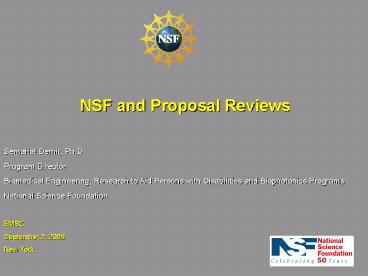NSF and Proposal Reviews - PowerPoint PPT Presentation
1 / 12
Title:
NSF and Proposal Reviews
Description:
To what extent does the proposed activity suggest and explore creative and original concepts? ... How well does the activity advance discovery and understanding ... – PowerPoint PPT presentation
Number of Views:16
Avg rating:3.0/5.0
Title: NSF and Proposal Reviews
1
NSF and Proposal Reviews
Semahat Demir, Ph.D. Program Director Biomedical
Engineering, Research to Aid Persons with
Disabilities and Biophotonics Programs National
Science Foundation EMBS September 2, 2006 New
York
2
Funding Opportunities at NSF
- Individual Programs
- Research, education, center programs
- Priority Areas (Investment Areas for FY)
- Cross-Programs and Cross-Directorates
- Cross Disciplinary Areas
- Cross-Programs and Cross-Directorates
- Interagency Programs
- NSF, and other government agencies
3
Award (Grant) Types
- Individual Investigator Initiated Awards
- CAREER Awards
- Center Awards
- SBIR awards
- SGER awards
- Supplements
- Workshops, conferences
4
NSF Disciplines Structure
- Biological Sciences (BIO)
- Computer and Information Sciences and Engineering
(CISE) - Education and Human Resources (EHR)
- Engineering (ENG)
- Biomedical Engineering Research to Aid Persons
with Disabilities (BME/RAPD) Programs - Geosciences (GEO)
- Mathematical and Physical Sciences (MPS)
- Social, Behavioral And Economic Sciences (SBE)
- Polar Programs
- Office of Cyberinfrastructure
- Office of International Science and Engineering
- Office of Integrative Affairs
5
NSF Merit Review Criteria
- Criteria include
- What is the intellectual merit and quality of the
proposed activity? - What are the broader impacts of the proposed
activity?
6
What is the intellectual merit of the proposed
activity?
- Potential Considerations
- How important is the proposed activity to
advancing knowledge and understanding within its
own field or across different fields? - How well qualified is the proposer (individual or
team) to conduct the project? (If appropriate,
the reviewer will comment on the quality of prior
work.) - To what extent does the proposed activity suggest
and explore creative and original concepts? - How well conceived and organized is the proposed
activity? - Is there sufficient access to resources?
7
What are the broader impacts of the proposed
activity?
- Potential Considerations
- How well does the activity advance discovery and
understanding while promoting teaching, training
and learning? - How well does the activity broaden the
participation of underrepresented groups (e.g.,
gender, ethnicity, disability, geographic, etc.)?
- To what extent will it enhance the infrastructure
for research and education, such as facilities,
instrumentation, networks and partnerships? - Will the results be disseminated broadly to
enhance scientific and technological
understanding? - What may be the benefits of the proposed activity
to society?
8
Review Panels
- The review panels are held at NSF.
- The reviews are entered in the Interactive Panel
System before the panel meetings. - The panelists are allowed to change their
reviews, grades and ratings during the panels.
9
Panelist Activity
- For each proposal
- Primary reviewer (lead) summarizes and then
comments on the proposal - The secondary reviewers concur and/or add their
comments - The floor is open for panel discussion
- Primary reviewer takes notes and writes panel
summary. - Final Recommendation Categories
- Highly Recommended (HR)
- Recommended (R)
- Not recommended (NR)
10
Panel Summary
- Objectives of the proposal
- Intellectual merit
- Strengths weaknesses
- Broader impact
- Strengths weaknesses
- Panel Summary Statement
- Panel recommendation and rationale
- The primary reviewer writes the panel summary.
- Primary and secondary reviewers edit for
substance and tone to develop a summary
reflecting the consensus of the panel. - Reviews and panel summaries are important
feedback to PIs.
11
PI receives
- Individual review
- Panel summary
- Program Directors analysis and recommendation
(award/decline) - Program Director
- Review Panels
- Award/decline recommendation
- Post management of the awards (progress report)
12
Thanks for the invitation! www.nsf.gov































